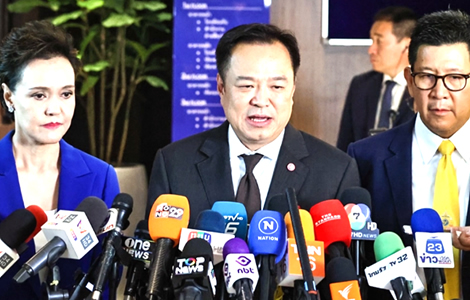Constitutional Court ruling blocks citizens from electing a constituent assembly, throwing PM Anutin’s new government into turmoil as the People’s Party stays silent, raising fears of partisan influence, instability, and ongoing delays in the constitutional reform process.
A Constitutional Court ruling on Wednesday has thrown Prime Minister Anutin Charnvirakul a major curveball even before his cabinet is sworn in. The court ruled that the people, through a constituent assembly, cannot draft a new constitution under existing provisions, effectively limiting public influence. In response, Mr. Anutin immediately announced a Bhumjaithai Party panel, led by incoming Minister of Digital Economy and Society Chaichanok Chidchob, to steer the process. Yet crafting a workable, democratic, and flexible constitution to ensure political stability was already a contentious point in last week’s party agreement that brought Mr. Anutin to power. Tensions are further fueled by concern over his cabinet, especially the proposed Minister of Justice, raising fears of partisan influence before the government even takes office. The People’s Party remain strikingly silent, perhaps signalling unease and uncertainty over what comes next.

A Constitutional Court ruling on Wednesday, September 10, has introduced significant uncertainty into Thailand’s constitutional reform process. The decision may complicate efforts to amend the 2017 Constitution. Furthermore, it risks creating tension between the interim government and the People’s Party, which has promised its support for four months following the government’s policy statement.
Previously, the court ruled that only the people could initiate work on a new constitution. However, the latest decision now prohibits citizens from directly electing a constituent assembly to draft and recommend a new charter. As a result, critics argue that this limits the public’s power in shaping the country’s fundamental laws.
Constitutional Court ruling limits citizens from electing a constituent assembly to draft a new Thai constitution
Opposition members in both the Senate and House of Representatives have expressed deep concern. They warn that the ruling may repeat patterns seen in 2017, when powerful political forces controlled the constitutional drafting process. In particular, they fear that the Bhumjaithai Party and aligned conservative factions could dominate the process through committee appointments rather than public participation.
The concern is intensified because the Bhumjaithai Party is widely perceived to control the Senate unofficially. A majority of senators reportedly support the party consistently. Consequently, this structural advantage could allow the ruling party to influence the selection of constitutional drafters. Political analysts say this may skew the drafting process toward partisan interests.
Immediately after the court ruling, Prime Minister Anutin Charnvirakul announced the creation of a Bhumjaithai Party panel to address the constitutional amendments. Chaichanok Chidchob, Secretary-General of the party and member of parliament, was appointed head of the panel. Chaichanok is also set to become Minister of Digital Economy and Society. The appointment emphasises the party’s newfound determination to guide constitutional reform.
Concerns rise over Bhumjaithai influence and cabinet appointments before government is sworn in
Simultaneously, concerns have arisen regarding the appointment of a Minister of Justice. Prime Minister Anutin indicated that the position would be filled by an outside figure. Nevertheless, critics worry that any Minister of Justice linked to the Bhumjaithai Party could interfere with ongoing investigations. The Department of Special Investigation (DSI) is probing alleged collusion in the 2024 Senate elections. Therefore, any perceived interference could undermine public confidence in the legal process.
Additionally, a committee of the Election Commission has escalated the matter within the agency. Reports indicate that senior figures from the Bhumjaithai Party are implicated. This development adds another layer of complexity to an already delicate constitutional amendment process.
While Mr. Chaichanok leads the team, Paradorn Prisananantakul serves as deputy head. Other members include Siriphong Angkasakulkiat, Worasit Liangprasit, Pimrueda Tanjararak, and Thanis Sriprathet, who acts as secretary.
Bhumjaithai working group tasked with managing the referendum and constitutional drafting process
The working group’s mandate is extensive. First, it must study the referendum process under the Constitution, the Referendum Act, and the court’s ruling. Second, it must outline clear procedures and timelines for constitutional amendments. Third, the group will draft amendments leading to a new constitution and submit them to the Bhumjaithai Party executive committee. Finally, the team is required to report unresolved obstacles directly to the party leader.
Certainly, this is not the constitutional reform that the People’s Party envisaged when it signed its agreement with the Bhumjaithai Party last week. Certainly, on Wednesday, People’s Party leader Nattapong Ruangpanyawut appeared reluctant to comment on the matter of Mr. Anutin’s new cabinet.
Of course, it is understood that the main opposition party wishes to let the new Prime Minister find his feet. Nevertheless, today’s movements on constitutional reform are bound to raise tensions.
Opposition wary as new Bhumjaithai initiatives move forward amid political unease for the People’s Party
Prime Minister Anutin emphasised that his approach ensures compliance with legal frameworks while expediting the drafting of a new constitution. He argued that public referendums remain central to the process. However, critics maintain that control over the selection of drafters could allow partisan forces to shape the outcome.
Meanwhile, the Pheu Thai Party has proposed a more aggressive strategy. They plan to hold two referendums simultaneously. Chaturon Chaisang, a Pheu Thai Party list MP, argued that the Constitutional Court contradicted its earlier ruling affirming that the people hold the power to establish a constitution.
He posted on social media that citizens should vote on whether a constituent assembly elected by the people should draft the new constitution. Chaturon said the court’s latest decision undermines democratic principles. He emphasised that the ruling does not address the issues originally submitted by Parliament. Therefore, he believes legal ambiguities remain. He also noted that the combined referendums could clarify public opinion while avoiding unnecessary delays in the drafting process.
Pheu Thai warns that the court ruling undermines democratic participation in drafting new constitution
Some senators have expressed shock at the ruling. They fear that prohibiting citizens from selecting the Constituent Assembly could allow masked individuals to manipulate the process. Dr. Premsak Piayura, a senator who earlier submitted the motion to the Constitutional Court, warned that the ruling could trigger a prolonged constitutional deadlock.
Dr. Premsak stated that citizens not directly electing the Constituent Assembly could allow political parties to dominate the selection process. This risk is particularly high because the Bhumjaithai Party controls both the lower and upper houses. This includes the majority of blue-shirt Senate members. He cautioned that this could result in a constitution dictated by partisan interests rather than public will.
The court has stipulated that three referendums are required for constitutional amendments. The first addresses whether a new constitution should be drafted. The second covers the drafting process, including methods and key contents. The third allows the public to approve or reject the completed draft constitution.
Dr. Premsak suggested holding the first and second referendums simultaneously. The first question would ask whether citizens approve of drafting a new constitution. The second would seek approval for the proposed methods and essential content. He argued this approach would allow Parliament to work within legal frameworks while providing citizens meaningful input.
Senators and experts call for simultaneous referendums to maintain transparency and public input
Moreover, Dr. Premsak recommended holding these referendums alongside national elections. This timing would align with the requirement to dissolve Parliament within four months of forming a new government. It would also conserve national resources and reduce administrative burdens.
The third referendum would take place once the Constituent Assembly completes the draft constitution. Citizens would vote to approve or reject the final version. Analysts estimate that the entire process could take approximately two years. They caution that any interference or political obstruction could further delay constitutional reform.
The Bhumjaithai Party working group, meanwhile, is tasked with ensuring transparency and legal compliance. Its members will study laws, prepare procedural timelines, and solicit public opinion. They are also responsible for submitting recommendations and reporting obstacles promptly. The aim is to expedite constitutional drafting while adhering to the court’s ruling.
Despite assurances from the ruling party, critics remain sceptical. Opposition figures argue that Bhumjaithai’s influence over both houses and investigative agencies could shape constitutional outcomes. They warn that partisan control may repeat issues observed during the drafting of the 2017 Constitution.
Observers warn that Bhumjaithai control could replicate 2017 constitutional issues and partisan influence
Supporters of the Bhumjaithai Party argue that their actions comply with legal requirements. They note that referendums ensure the public retains the ultimate decision-making power. Party officials insist that all steps will follow the Constitution and the Constitutional Court’s guidance.
Observers highlight Thailand’s history of constitutional instability. Analysts warn that any perceived manipulation in the process could fuel domestic and international criticism. They emphasise that credibility and legitimacy are essential for the new constitutional framework to succeed.
Public attention will now focus on the working group’s progress, referendum timing, and Constituent Assembly selection. Civil society organisations, political parties, and citizens are expected to monitor all stages closely. Transparency and accountability will likely determine public confidence in the outcome.
Of course, the substantial matters include the flexibility and freedom to elect a Prime Minister. After that, the opposition would like to see the constraints imposed on politicians limited, so that being in government does not continue to be a constitutional minefield. These matters require debate and consensus, but ultimately may require majority decisions by representatives.
Public and opposition demand reforms to ensure democratic stability and limit constitutional constraints
A drafting committee is likely to produce the same oppressive sort of charter that is now law in Thailand. Therefore, this matter goes directly to allowing Thailand to function democratically and maintain stable, long-term governments, which cannot be overthrown by the Constitutional Court on a whim.
Five Prime Ministers in the last twenty years have been removed in this way. The situation is a recipe for instability, which in turn has blighted the economy.
Nevertheless, Wednesday’s Constitutional Court rulings illustrate the tension between direct citizen participation and parliamentary control. How these rulings are implemented will influence Thailand’s political, legal, and certainly economic landscape in the decades to come. The country has consistently failed to find a stable constitutional basis.
Constitutional instability continues to threaten government continuity and the nation’s economy
Meanwhile, analysts predict heightened scrutiny and potential conflict if the process appears partisan or opaque. As Thailand advances toward constitutional reform, the challenge will be balancing legal compliance, public participation, and political influence.
The upcoming months will test whether the new process can deliver a genuinely democratic constitution or whether it risks repeating past controversies.
PM Paetongtarn Shinawatra ousted by Constitutional Court, collapsing Thai government over audio clip
Business community bewildered by the country’s 25 years of political infighting which still continues
Certainly, at some point, the question of government stability and the economic impact must be examined. In past efforts, this has been overlooked, with the focus on professing human rights and what is now seen as excessive, indeed oppressive, accountability. Such excessive accountability reduces the scope and capability of able politicians and leaders.
Join the Thai News forum, follow Thai Examiner on Facebook here
Receive all our stories as they come out on Telegram here
Follow Thai Examiner here
Further reading:
Thaksin stuns Bangkok’s political establishment by returning from Dubai ahead of his Tuesday hearing
Thaksin tells Pheu Thai leaders he will return on Monday to face Tuesday’s Supreme Court hearing
People’s Party meeting on Monday ended in chaos as it failed to decide on who it will support for PM
Strong case for Chaikasem Nitisiri to lead an interim government tasked with Constitutional change


















